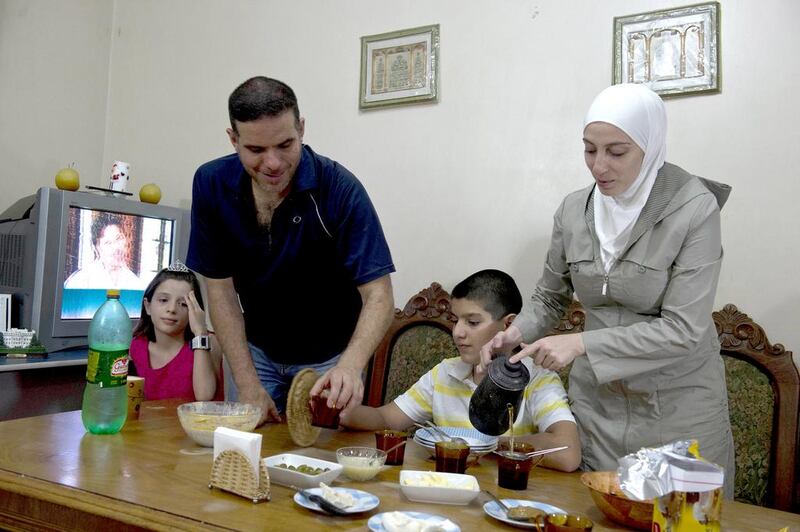BEIRUT // As Turkey and the EU hash out a plan that could make it even harder for millions of desperate Syrian refugees to reach western Europe, some migrants are looking for farther-flung destinations in which to make a new life.
Though on the other side of the world from the Syrian conflict, Ecuador and Brazil are countries Syrians can get to safely, easily and even legally, yet so far very few have chosen that path.
Refugees heading to these South American countries do not have to endure a perilous journey by sea on overcrowded boats. Nor do they risk getting robbed and abandoned by smugglers, forced into detention and deportation by government agents or having to run from burning tear gas at closed borders.
The only thing they need in order to get to Brazil or Ecuador is enough money for a one-way plane ticket, costing around US$1,000 (Dh3,672) from the refugee hubs of Turkey and Lebanon – a sum comparable to the fee that many smugglers charge for a seat on an inflatable raft from Turkish beaches to Greek islands like Kos or Lesbos.
Yet other challenges, including language barriers and a fear of the unknown, stand between Syrians and South America.
In 2013, Brazil initiated a policy of granting Syrian nationals humanitarian visas from its diplomatic missions abroad. The visas allow entry to Brazil, where Syrians can easily obtain status as a refugee or resident. Brazil currently has no cap on how many Syrian refugees it will take in and the humanitarian visa programme is scheduled to continue through late 2017.
Ecuador, meanwhile, does not require Syrians to obtain a visa prior to travel at all – they can simply show up.
According to Brazil’s charge d’affaires to Syria, Achilles Zaluar, 9,000 humanitarian visas have been issued to Syrians and people residing in Syria – such as Palestinian refugees – since 2013. Between 2,500 and 3,000 who obtained those visas have already completed the process of acquiring refugee status inside Brazil.
While formal resettlement programmes in places like the United States, Canada and European countries are the dream for many Syrians living in refugee camps in the Middle East, their chances of being resettled in such countries are often remote. And even for those chosen or being considered for resettlement, the actual procedure can be a long, drawn-out process fraught with uncertainty. Frustrated by these low chances, many Syrians have taken to illegally crossing into Europe by boat.
But getting to Europe by boat could soon become much more difficult. A deal tentatively agreed to between Ankara and the European Union on Monday could see Turkey taking back all illegal migrants landing in Greece. Meanwhile, new Turkish regulations requiring visas for Syrians arriving by air or sea act as an additional roadblock for many hoping to embark on the migrant trail.
Syrians looking to go to Brazil, however, have much better chances of success. Mr Zaluar estimated that 90 per cent of people who applied for humanitarian visas were granted one. Only those who lacked necessary documents, were believed to be a security threat or were non-Syrians posing as Syrians have been rejected.
“They may choose Brazil because they are tired of waiting for a visa to another country,” said Mr Zaluar.
Far fewer Syrian refugees have arrived in Ecuador, despite the country not requiring any kind of visa for Syrians. Sonia Aguilar, a public information officer with the United Nations’ refugee agency (UNHCR) in Ecuador, said about 50 Syrians have claimed asylum in Ecuador since the war began in 2011.
“I think it’s interesting because when you have all this human smuggling and trafficking networks taking advantage of this difficult situation of the people … then you realise it’s far cheaper travelling in the regular ways,” she said. “When they realise it is a safe pathway, they do it.”
Ecuador is “a long, difficult journey” for refugees, she said, but “it’s much safer than travelling just to reach Greece”.
Ecuador and Brazil are an easy way out for Syrian refugees, but they are not without challenges.
Neither country is able to provide the kind of assistance that nations with formal resettlement programmes give to refugees and the assistance refugees receive is limited. While refugees are permitted to work in these countries, without Portuguese or Spanish, their options will be limited. Many will have to survive financially until they can learn the language and be integrated into the workforce.
“When they get to Brazil, they don’t receive the same kind of help they receive in Europe, for instance. It’s a more modest programme. Brazil is not Sweden,” said Mr Zaluar, the Brazilian charge d’affaires to Syria.
The cultural and language barrier is less daunting in Brazil due to its millions of citizens with Lebanese and Syrian ancestry, some of whom speak Arabic.
While refugees can get to Brazil and Ecuador easily and safely, many still aspire to get to Europe, the US and Canada where they see greater opportunities and economic potential.
Heading to South America also remains an unknown. With about half of the one million refugees who arrived in Europe last year being Syrian, many refugees stuck in camps and shared apartments in Lebanon, Turkey and Jordan know somebody who has completed the journey.
The logistics, the dangers and what to expect on arrival are all variables that have been well explored. But when it comes to Brazil and Ecuador, few have any knowledge about what life would be like in these countries.
Elsewhere in South America, Venezuelan president Nicolas Maduro said last year that his country was prepared to take in 20,000 Syrian refugees.
“I want 20,000 Syrians to come to our Venezuelan fatherland, to share this land of peace, of Christ, of [Simon] Bolivar, and to help with the development of this magical land,” he announced last September.
However, there have not been signs that the country, which is stuck in a crippling economic crisis, has made further moves on the resettlement project.
“Setting up a resettlement programme is a big thing for a country because you have to accompany it with a lot of measures to ensure that local integration of the resettled refugees is actually possible,” said Wendy Zillich, a protection officer with UNHCR in Venezuela.
jwood@thenational.ae





